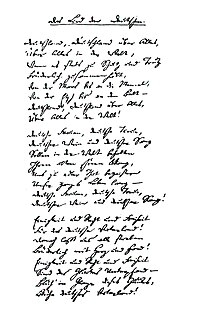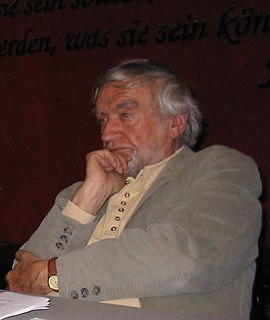Related Research Articles

The "Deutschlandlied", officially titled "Das Lied der Deutschen", or part of it, has been the national anthem of Germany since 1922. In East Germany, the national anthem was "Auferstanden aus Ruinen" between 1949 and 1990.
BRD ; is an unofficial abbreviation for the Federal Republic of Germany, informally known in English as West Germany until 1990, and just Germany since reunification. It was occasionally used in the Federal Republic itself during the early Cold War; it was commonly used between 1968 and 1990 by the ruling party of the German Democratic Republic, resulting in a strong deprecation of its use in West Germany. The East German regime had previously used the term "German Federal Republic", which it abbreviated as "DBR", to refer to West Germany. The most widely used abbreviation for West Germany in the country itself was its ISO 3166-1 alpha-2 country code "DE", which has remained the country code of reunified Germany.

Charles Anthony Fried is an American jurist and lawyer. He served as United States Solicitor General under President Ronald Reagan from 1985 to 1989. He is a professor at Harvard Law School and has been a visiting professor at Columbia Law School. He also serves on the board of the nonpartisan group, the Campaign Legal Center.

Berliner Fussball Club Dynamo e. V., commonly abbreviated to BFC Dynamo or BFC, alternatively sometimes called Dynamo Berlin, is a German football club based in the Alt-Hohenschönhausen locality of Berlin. BFC Dynamo was formed in 1966 from the football department of SC Dynamo Berlin and was one of the key clubs of East German football. The club is the record champion of East Germany with ten consecutive league championships from 1979 through 1988. BFC Dynamo competes in the fourth tier Regionalliga Nordost.

Hilde Benjamin was an East German judge and Minister of Justice. She is best known for presiding over a series of political show trials in the 1950s. She is particularly known as responsible for the politically motivated persecution of Erna Dorn and Ernst Jennrich. Hilde Benjamin was widely compared to the Nazi-era judge Roland Freisler and referred to as the "Red Freisler." In his 1994 inauguration speech German President Roman Herzog mentioned Benjamin's status as a symbol of injustice, noting that her name was incompatible with the German constitution and the rule of law.
Immo Stabreit is a German diplomat, and was West German and German Ambassador to South Africa from 1987 to 1992, Ambassador to the United States from 1992 to 1995 and Ambassador to France from 1995 to 1998. He is a Member of the Advisory Board of the Global Panel Foundation, a respected NGO that works behind the scenes in crisis areas around the world.

Richard Clark Barkley was a United States diplomat. From December 1988 until October 1990, he was the last United States Ambassador to East Germany. After that, from 1991 to 1994, he was the United States Ambassador to Turkey.
Rudolf Dölling was a politician in Czechoslovakia and in East Germany. He later trained for military service and was made a Major-General in the National People's Army of East Germany.

Vyacheslav Kochemasov (1918–1998) was a Russian diplomat and politician.

Thomas Ammer is a German historian who as a young man studied to become a physician. He was arrested and imprisoned in 1958 for anti-government political activism in East Germany and he never qualified as a medical doctor. His 15-year prison sentence was cut short in August 1964 when his release was purchased by the West German government, and at the age of 27 he relocated to the German Federal Republic.

Harry Ott was a German diplomat who became a politician towards the end of his professional career.
Dr Christoph Müller is a former German diplomat and was Ambassador of the Federal Republic of Germany in Canberra, Australia. He has been in the service of the German Foreign Office since 1981 and has served previously as Ambassador to Peru from 2006 to 2011.

Gerhard Zwerenz was a German writer and politician. From 1994 until 1998 he was a member of the Bundestag for the Party of Democratic Socialism (PDS).
Horst Bartel was a German historian and university professor. He was involved in most of the core historiography projects undertaken in the German Democratic Republic (1949–1989). His work on the nineteenth-century German Labour movement places him firmly in the mainstream tradition of Marxist–Leninist historical interpretation.
Christa Schmidt is a retired German politician (CDU) who served as a minister in the last government of East Germany. She built an earlier career as a teacher and educationalist.

Tilo Medek, originally Müller-Medek, was a German classical composer, musicologist and music publisher. He grew up in East Germany, but was inspired by the Darmstädter Ferienkurse. He composed radio plays and incidental music. His setting of Lenin's Decree on Peace led to restrictions, and after he showed solidarity with the expatriated Wolf Biermann, he also had to move to the West, where he composed an opera Katharina Blum based on Heinrich Böll's novel, and worked in education. He received international awards from 1967 on.

Dagmar Enkelmann is a German politician.

Gerhard Riege was a respected East German law professor.
References
- ↑ Harvard Law School, The Graduate Program at Harvard Law School, Harvard University, 1956
- ↑ Office of the Historian ,
- ↑ The Agency, Weekly Bulletin, 1978, p. 17 Neues Deutschland , 20.06.1978 - Der Vorsitzende des Ministerrates der DDR, Willi Stoph, empfing am Montag den Außerordentlichen und Bevollmächtigten Botschafter der Ungarischen Volks Republik in der DDR, Jözsef Kádár, und den Außerordentlichen und Bevollmächtigten Botschafter Neuseelands, in der DDR, Francis Anthony Small, zu Antrittsbesuchen,
- ↑ "Francis Small death notice". Hawkes Bay Today. 27 February 2015. Retrieved 21 January 2017.